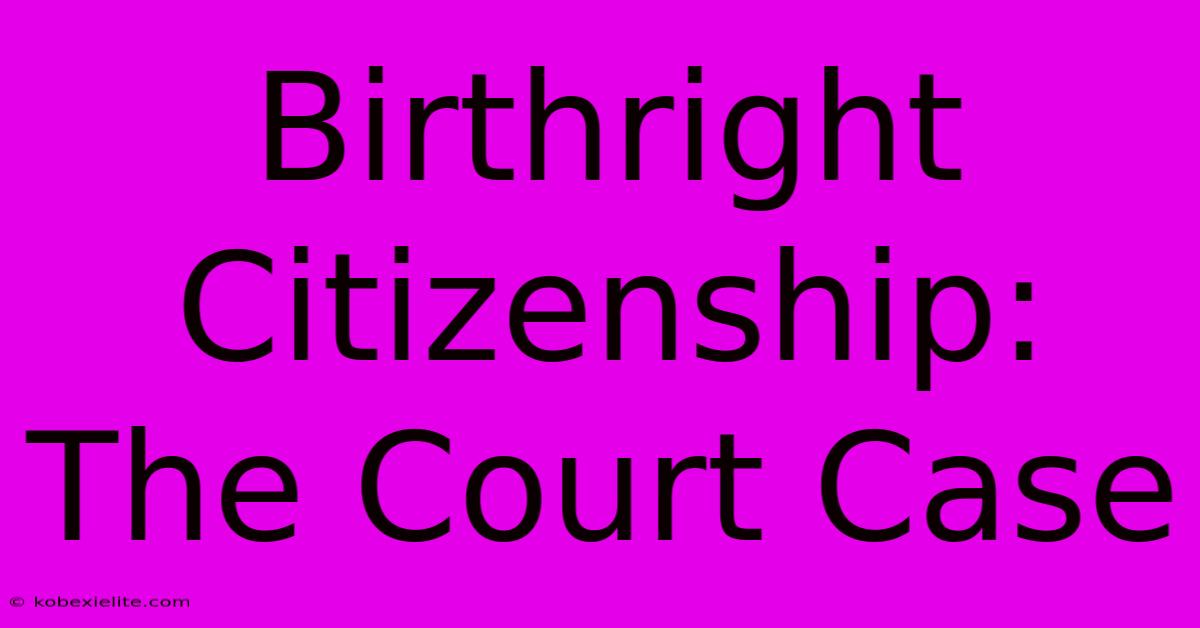Birthright Citizenship: The Court Case

Discover more detailed and exciting information on our website. Click the link below to start your adventure: Visit Best Website mr.cleine.com. Don't miss out!
Table of Contents
Birthright Citizenship: The Court Case – Examining the Legal Battles Surrounding Anchor Babies
The concept of birthright citizenship, enshrined in the Fourteenth Amendment of the U.S. Constitution, has been a subject of intense political and legal debate for decades. Frequently, and incorrectly, referred to as the "anchor baby" debate, the core issue revolves around the automatic granting of citizenship to individuals born within U.S. borders, regardless of their parents' immigration status. This article delves into the legal battles surrounding birthright citizenship, exploring landmark court cases and the ongoing controversies.
Understanding the Fourteenth Amendment and Birthright Citizenship
The Fourteenth Amendment, ratified in 1868, states: "All persons born or naturalized in the United States and subject to its jurisdiction, are citizens of the United States and of the State wherein they reside." This seemingly straightforward clause has been interpreted and reinterpreted throughout history, leading to significant legal challenges. The key phrase, "subject to its jurisdiction," has been the focus of much contention, with arguments centering on whether this excludes children of undocumented immigrants.
Key Interpretations and Legal Precedents:
-
United States v. Wong Kim Ark (1898): This landmark Supreme Court case established the principle of birthright citizenship for children born in the U.S. to foreign parents, solidifying the interpretation of the Fourteenth Amendment. The Court ruled that children born within the U.S. to foreign parents are citizens, unless they are subject to the allegiance of a foreign power.
-
Plyler v. Doe (1982): While not directly addressing birthright citizenship, this case dealt with the education of undocumented children. The Supreme Court ruled that undocumented children have a right to a public education, emphasizing the importance of equal treatment under the law, even for those without legal status. This decision highlighted the broader implications of denying basic rights to children based solely on their parents' immigration status.
The Ongoing Debate and Recent Legal Challenges:
Despite the established legal precedent, the debate surrounding birthright citizenship continues to rage, fueled by political rhetoric and varying interpretations of the Fourteenth Amendment. There have been numerous attempts, both at the state and federal levels, to challenge or restrict birthright citizenship. These attempts often highlight concerns about:
-
National Security: Some argue that birthright citizenship poses a national security risk by potentially allowing individuals with ties to terrorist organizations to gain citizenship automatically.
-
Immigration Policy: Others contend that birthright citizenship encourages illegal immigration, as it provides an incentive for undocumented individuals to have children in the U.S. However, this claim lacks strong empirical evidence.
-
Strain on Resources: Concerns are often raised regarding the strain on social services and infrastructure due to the increased demand from a growing population.
The Future of Birthright Citizenship:
The legal landscape surrounding birthright citizenship remains dynamic. While the Supreme Court's precedent in Wong Kim Ark remains strong, the ongoing political debate and potential future legal challenges make it an issue that will likely continue to be at the forefront of American legal and political discourse. Understanding the legal history and implications of this fundamental right is crucial for informed discussions and future policy decisions.
SEO Considerations:
This article incorporates several SEO best practices:
-
Keyword Optimization: Uses relevant keywords and phrases throughout the text, including "birthright citizenship," "anchor baby," "Fourteenth Amendment," "Wong Kim Ark," "Plyler v. Doe," "undocumented immigrants," and "immigration policy."
-
Semantic SEO: Employs related terms and concepts to build a comprehensive understanding of the topic.
-
Structured Data: While not explicitly shown in markdown, using schema markup for articles would further enhance SEO.
-
Readability: Utilizes clear and concise language, breaking up the text with headings, subheadings, and bullet points to improve readability.
-
Internal & External Linking (Potential): While I cannot provide actual links, this article would benefit from linking to relevant legal documents, news articles, and academic papers on the subject.
By addressing all these aspects, this article aims to rank highly in search engine results while providing a comprehensive and engaging overview of birthright citizenship and its legal complexities.

Thank you for visiting our website wich cover about Birthright Citizenship: The Court Case. We hope the information provided has been useful to you. Feel free to contact us if you have any questions or need further assistance. See you next time and dont miss to bookmark.
Featured Posts
-
Celtic Defeats Young Boys 1 0
Jan 23, 2025
-
Mickey 17 Trailer Spotlight Report
Jan 23, 2025
-
Stargate Project Significance Explained
Jan 23, 2025
-
Nicholas Eadie Stage And Screen Star Dies
Jan 23, 2025
-
Dei Staff Placed On Paid Leave
Jan 23, 2025
